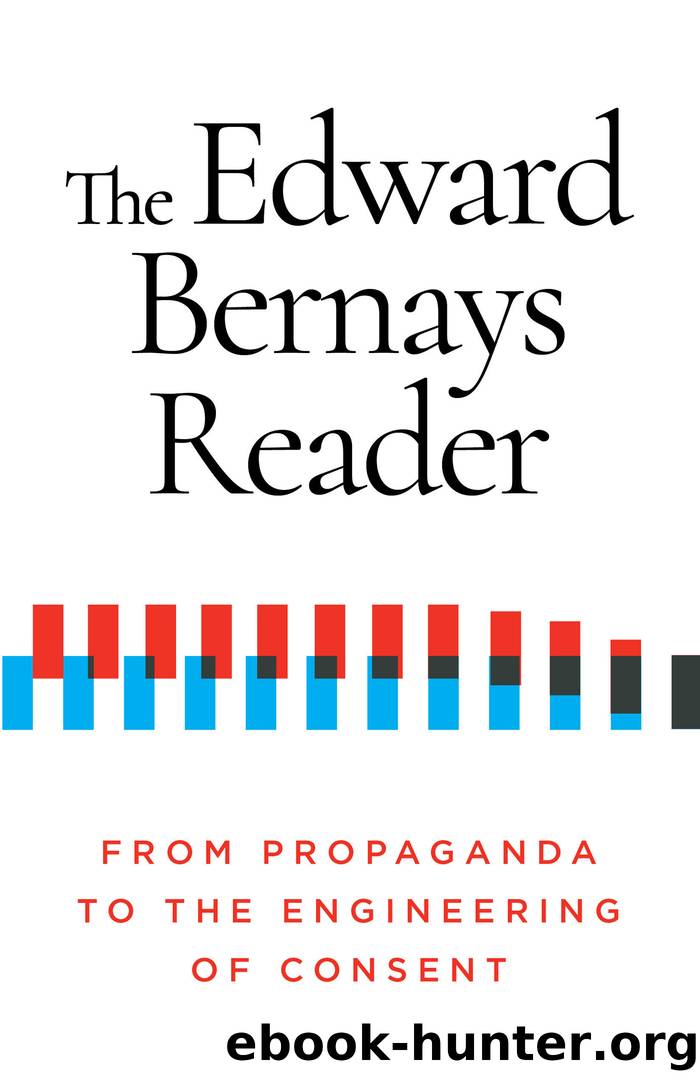The Edward Bernays Reader by Edward Bernays

Author:Edward Bernays
Language: eng
Format: epub
Publisher: IG Publishing
Published: 2021-12-15T00:00:00+00:00
1 Walter Lippman, Public Opinion, page 248.
PART II:
The Group and the Herd
CHAPTER I
WHAT CONSTITUTES PUBLIC OPINION?
THE CHARACTER AND ORIGINS OF PUBLIC OPINION, the factors that make up the individual mind and the group mind must be understood if the profession of public relations counsel is to be intelligently practiced and its functions and possibilities accurately estimated. Society must understand the fundamental character of the work he is doing, if for no other reason than its own welfare.
The public relations counsel works with that vague, little understood, indefinite material called public opinion.
Public opinion is a term describing an ill-defined, mercurial and changeable group of individual judgments. Public opinion is the aggregate result of individual opinions ânow uniform, now conflictingâof the men and women who make up society or any group of society. In order to understand public opinion, one must go back to the individual who makes up the group.
The mental equipment of the average individual consists of a mass of judgments on most of the subjects which touch his daily physical or mental life. These judgments are the tools of his daily being and yet they are his judgments, not on a basis of research and logical deduction, but for the most part dogmatic expressions accepted on the authority of his parents, his teachers, his church, and of his social, his economic and other leaders.
The public relations counsel must understand the social implications of an individualâs thoughts and actions. Is it, for example, purely an accident that a man belongs to one church rather than another or to any other church at all? Is it an accident that makes Boston women prefer brown eggs and New York women white eggs? What are the factors that work in favor of conversion of a man from one political party to another or from one type of food to another?
Why do certain communities resist the prohibition lawâwhy do others abide by it? Why is it difficult to start a new party movementâor to fight cancer? Why is it difficult to fight for sex education? Why does the free trader denounce protectionism, and vice versa?
If we had to form our own judgments on every matter, we should all have to find out many things for ourselves which we now take for granted. We should not cook our food or live in housesâin fact, we should revert to primitive living.
The public relations counsel must deal with the fact that persons who have little knowledge of a subject almost invariably form definite and positive judgments upon that subject.
âIf we examine the mental furniture of the average man,â says William Trotter, the author of a comprehensive study of the social psychology of the individual, âwe shall find it made up of a vast number of judgments of a very precise kind upon subjects of very great variety, complexity, and difficulty. He will have fairly settled views upon the origin and nature of the universe, and upon what he will probably call its meaning; he will have conclusions
Download
This site does not store any files on its server. We only index and link to content provided by other sites. Please contact the content providers to delete copyright contents if any and email us, we'll remove relevant links or contents immediately.
Kathy Andrews Collection by Kathy Andrews(10628)
The remains of the day by Kazuo Ishiguro(7629)
Spare by Prince Harry The Duke of Sussex(4268)
Paper Towns by Green John(4215)
The Body: A Guide for Occupants by Bill Bryson(3899)
Be in a Treehouse by Pete Nelson(3261)
Harry Potter and the Goblet Of Fire by J.K. Rowling(3165)
Goodbye Paradise(3025)
Never by Ken Follett(2964)
Into Thin Air by Jon Krakauer(2748)
The Remains of the Day by Kazuo Ishiguro(2657)
The Genius of Japanese Carpentry by Azby Brown(2649)
The Cellar by Natasha Preston(2644)
Drawing Shortcuts: Developing Quick Drawing Skills Using Today's Technology by Leggitt Jim(2562)
120 Days of Sodom by Marquis de Sade(2478)
Industrial Automation from Scratch: A hands-on guide to using sensors, actuators, PLCs, HMIs, and SCADA to automate industrial processes by Olushola Akande(2384)
Architecture 101 by Nicole Bridge(2380)
Machine Learning at Scale with H2O by Gregory Keys | David Whiting(2380)
The Man Who Died Twice by Richard Osman(2361)
